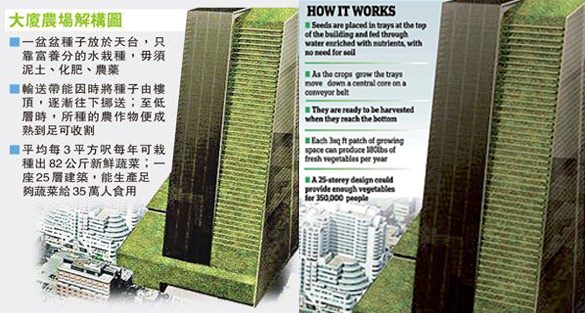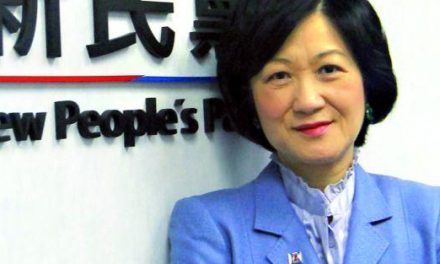- The ‘plantscrapers’ could accommodate hundreds of storeys worth of crops
- They would use an innovate feeding system cancelling out need for soil
- Farms will increase crop yields because growing can occur all year round
By SEAN POULTER, Daily Mail
Crops could soon be grown in greenhouses the size of skyscrapers in city centres across the country, it has been claimed.
Birds Eye and other food producers are investigating building ‘plantscrapers’, which could accommodate hundreds of storeys worth of crops, in a bid to make farming more economical, sustainable and meet increasing demand.
The ‘vertical farms’ would use an innovative feeding system which nourishes plants with enriched water, therefore cancelling out the need for soil – and the need for food to be grown and harvested in the countryside.
And because the climate inside them can be controlled, it is claimed the farms will dramatically increase crop yields because growing can occur all year round, while the plants would be under cover, so pesticides would not need to be used.
Some supermarket foods such as tomatoes and strawberries are already grown on farms using a primitive form of the so-called hydroponic system. Now there are sophisticated plantscrapers planned or under construction in Sweden, Japan, China, Singapore and Chicago in the U.S.
In Linkoping, Sweden, a 54-metre-high structure (just over half the height of Elizabeth Tower – home of Big Ben – in London) is being built by Swedish firm Plantagon.
By 2014, the structure will produce a range of leafy green vegetables, including salad leaves, spinach and mustard greens.
Now Birds Eye is looking into the success of the Verticrop hydroponic system which is being used at Paignton Zoo in Devon to produce cheap vegetable crops for its animals.
There, plants sit in trays which constantly move around a glass building on a conveyor belt to ensure they get the light they need.
Birds Eye is holding talks with Alterrus, the firm behind the technology, about how to increase the scale of the system, while it runs a trial growing herbs at the site.
Other key Birds Eye crops, such as peas and spinach, will be used in trials in the near future.
Birds Eye’s head of agriculture, James Young, said: ‘This method enables us to grow crops indoors within a controlled environment – reducing energy usage, removing the need for pesticides and eliminating the threat of bad weather while maximising on space.
‘Although the trial is still very much in its early stages, we believe that Verticrop could have the potential to make farming more sustainable while continuing to provide consumers with the best quality produce.’
A number of other British companies are also exploring the technology, including East End Foods, which is building a vertical farm at a site in Aston Cross, Birmingham. Company chairman Tony Deep Wouhra said the system has huge advantages over conventional farming because it speeds up the growing process and saves on space.
He told The Grocer magazine: ‘There is not enough food in the world. Some 67 per cent of agricultural land is used to produce food to rear animals and only 33 per cent for human food.
‘Urban people ought to understand it is possible to grow leafy plants that are healthy in 25 days.’
He said the method could be developed to allow families to grow food in tiers in their gardens or even on the balcony of a flat.
The idea of plantscrapers has been championed by Dickson Despommier, a professor of public health at Columbia University in the U.S.
He sees vertical farming as part of the answer to cutting global energy emissions, tackling water shortages and dealing with the demands of an ever-increasing population.
Dr Despommier said: ‘All the water is recycled, all the nutrients are recycled. All that leaves the building is the produce. This is a wonderful way of conserving water.
‘The biggest social benefit is that everyone gets fed. The idea is about to develop into reality.’
Source: Daily Mail
Picture: Daily Mail & Ming Pao










